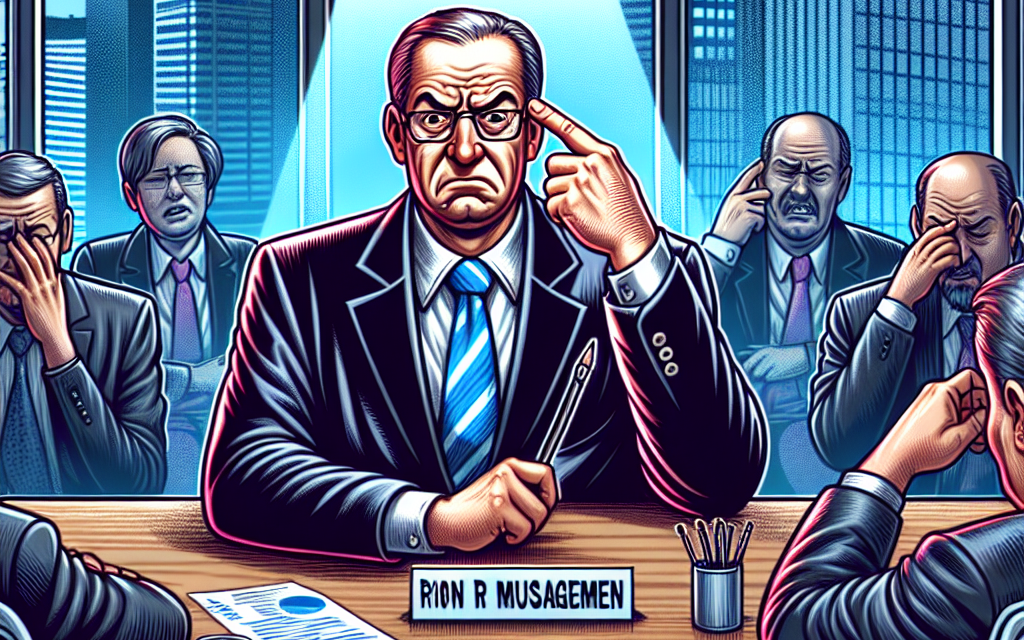“Kevin O’Leary: Unmasking Corporate America’s Missteps in Management and Insight.”
Introduction
In “Lost in Poor Management and Misreading the Room,” Kevin O’Leary offers a critical examination of corporate America, highlighting the pervasive issues stemming from ineffective leadership and a disconnect between executives and their workforce. O’Leary, a seasoned entrepreneur and investor, draws on his extensive experience to dissect the failures of management that lead to missed opportunities and diminished company performance. He argues that many corporations are plagued by a lack of vision and an inability to adapt to changing market dynamics, ultimately resulting in a culture that stifles innovation and employee engagement. Through incisive analysis and candid observations, O’Leary calls for a reevaluation of corporate strategies and a renewed focus on understanding the needs of both employees and consumers to foster sustainable growth and success.
Kevin O’Leary’s Perspective on Corporate Mismanagement
Kevin O’Leary, a prominent entrepreneur and investor, has consistently voiced his concerns regarding the state of corporate America, particularly emphasizing the pervasive issues of mismanagement and a fundamental disconnect between leadership and the realities of the marketplace. His critiques are not merely anecdotal; they stem from a deep understanding of business dynamics and a keen observation of the trends that have shaped corporate behavior in recent years. O’Leary argues that many companies have become “lost in poor management,” a phrase that encapsulates his belief that ineffective leadership is a significant barrier to success in today’s competitive environment.
One of the core issues O’Leary highlights is the tendency of corporate leaders to misread the room, which refers to their inability to accurately gauge market conditions, consumer sentiment, and employee morale. This misreading often leads to misguided strategies that fail to resonate with stakeholders. For instance, O’Leary points out that many companies have adopted overly ambitious growth targets without considering the economic landscape or the capabilities of their workforce. This disconnect can result in unrealistic expectations, ultimately leading to employee burnout and disengagement, which further exacerbates the problem of poor management.
Moreover, O’Leary emphasizes the importance of adaptability in corporate strategy. In an era characterized by rapid technological advancements and shifting consumer preferences, companies must be agile and responsive. However, he observes that many organizations remain entrenched in outdated practices and rigid hierarchies, which stifle innovation and hinder their ability to pivot when necessary. This lack of flexibility not only affects a company’s bottom line but also diminishes its competitive edge in an increasingly dynamic market.
In addition to adaptability, O’Leary underscores the significance of effective communication within organizations. He argues that a failure to foster open dialogue between management and employees can lead to a culture of mistrust and disengagement. When leaders do not actively seek input from their teams or fail to communicate their vision clearly, it creates a disconnect that can have far-reaching consequences. O’Leary believes that successful companies prioritize transparency and encourage feedback, thereby creating an environment where employees feel valued and motivated to contribute to the organization’s success.
Furthermore, O’Leary critiques the tendency of some corporate leaders to prioritize short-term gains over long-term sustainability. He warns that this focus on immediate results can lead to decisions that undermine a company’s future viability. For example, cutting costs at the expense of employee development or neglecting investment in research and development may yield short-term financial benefits but can ultimately jeopardize a company’s ability to innovate and grow in the long run. O’Leary advocates for a balanced approach that considers both immediate performance and long-term strategic goals.
In conclusion, Kevin O’Leary’s perspective on corporate mismanagement serves as a clarion call for leaders to reassess their strategies and practices. By recognizing the importance of adaptability, effective communication, and a long-term vision, corporate America can begin to address the issues that have led to its current state of disarray. O’Leary’s insights challenge leaders to not only reflect on their management styles but also to engage more meaningfully with their teams and the market at large. Ultimately, his critiques highlight the need for a fundamental shift in how companies operate, ensuring they are not only responsive to the present but also prepared for the future.
The Impact of Poor Leadership on Company Culture
In recent discussions, Kevin O’Leary has articulated a critical perspective on the state of corporate America, particularly emphasizing the detrimental effects of poor leadership on company culture. This critique resonates deeply in an era where organizations are increasingly recognizing that their internal environment significantly influences overall performance and employee satisfaction. Poor leadership, as O’Leary suggests, often manifests in a lack of vision and direction, which can lead to a disjointed company culture that fails to inspire or engage employees.
When leadership is ineffective, it creates a ripple effect throughout the organization. Employees may feel disconnected from the company’s mission and values, leading to a decline in morale and productivity. This disconnection often stems from leaders who are out of touch with their teams, failing to understand the nuances of their workforce’s needs and aspirations. As a result, employees may become disengaged, feeling that their contributions are undervalued or overlooked. This disengagement can foster an environment where innovation stagnates, as individuals are less likely to share ideas or take initiative when they perceive a lack of support from their leaders.
Moreover, poor management can lead to a culture of fear rather than one of collaboration and trust. When leaders prioritize control over empowerment, employees may hesitate to voice their opinions or take risks, fearing negative repercussions. This atmosphere stifles creativity and hinders problem-solving, as individuals become more focused on avoiding mistakes than on pursuing excellence. O’Leary’s observations highlight the importance of fostering a culture where employees feel safe to express their thoughts and take calculated risks, as this is essential for driving growth and adaptability in an ever-changing business landscape.
In addition to stifling creativity, ineffective leadership can also contribute to high turnover rates. When employees feel unsupported or undervalued, they are more likely to seek opportunities elsewhere. This not only disrupts team dynamics but also incurs significant costs for organizations in terms of recruitment and training. O’Leary’s critique underscores the necessity for leaders to cultivate a positive work environment that prioritizes employee well-being and development. By investing in their workforce, companies can enhance retention rates and build a more cohesive and motivated team.
Furthermore, the impact of poor leadership extends beyond internal dynamics; it can also affect a company’s reputation in the marketplace. Organizations that are perceived as having a toxic culture may struggle to attract top talent, as prospective employees often conduct thorough research into a company’s work environment before accepting job offers. O’Leary’s insights serve as a reminder that leadership is not merely about managing resources but also about shaping the culture that defines an organization. A strong, positive culture can serve as a competitive advantage, enabling companies to differentiate themselves in a crowded marketplace.
In conclusion, Kevin O’Leary’s critique of corporate America sheds light on the profound implications of poor leadership on company culture. As organizations navigate the complexities of the modern business environment, it is imperative for leaders to recognize their pivotal role in shaping a positive and engaging workplace. By fostering an environment of trust, collaboration, and empowerment, leaders can not only enhance employee satisfaction but also drive organizational success. Ultimately, the responsibility lies with leadership to ensure that they are not lost in poor management and misreading the room, but rather, are actively cultivating a culture that inspires and motivates their teams.
Misreading Market Trends: Lessons from Kevin O’Leary
Kevin O’Leary, a prominent entrepreneur and investor, has consistently voiced his concerns regarding the state of corporate America, particularly emphasizing the pervasive issue of misreading market trends. His critiques serve as a clarion call for businesses to reassess their strategies and align more closely with the evolving landscape of consumer preferences and economic conditions. O’Leary argues that many companies are ensnared in a cycle of poor management, which ultimately leads to a disconnect between their offerings and the actual needs of the market.
One of the key lessons O’Leary imparts is the importance of agility in corporate strategy. In an era characterized by rapid technological advancements and shifting consumer behaviors, businesses must remain vigilant and responsive to changes. O’Leary points out that many corporations fall into the trap of relying on outdated data and traditional business models, which can result in a significant lag in their ability to adapt. This misalignment not only hampers growth but can also lead to a loss of market share to more agile competitors who are better attuned to the current climate.
Moreover, O’Leary emphasizes the necessity of understanding consumer sentiment. He argues that companies often overlook the subtleties of market trends, focusing instead on broad metrics that fail to capture the nuances of consumer behavior. For instance, during economic downturns, consumers may prioritize value over luxury, yet many corporations continue to push high-end products without recognizing this shift. This disconnect can lead to inventory surpluses and financial losses, as businesses stubbornly cling to their established identities rather than pivoting to meet the immediate needs of their customers.
In addition to consumer sentiment, O’Leary highlights the role of effective communication within organizations. He believes that poor internal communication can exacerbate the misreading of market trends. When teams are not aligned or when there is a lack of transparency regarding strategic goals, it becomes increasingly difficult for companies to respond effectively to external changes. O’Leary advocates for fostering a culture of open dialogue, where insights from various departments can inform decision-making processes. This collaborative approach not only enhances the ability to read market signals accurately but also empowers employees to contribute to the company’s strategic direction.
Furthermore, O’Leary underscores the significance of leveraging data analytics in decision-making. In today’s data-driven world, companies have access to an unprecedented amount of information that can provide valuable insights into market trends. However, he cautions that merely collecting data is insufficient; organizations must also possess the analytical capabilities to interpret this information effectively. By employing advanced analytics, businesses can identify emerging trends, understand consumer preferences, and make informed decisions that align with market demands.
Ultimately, O’Leary’s critiques of corporate America serve as a reminder of the critical importance of adaptability, communication, and data-driven decision-making in navigating the complexities of the modern marketplace. As companies strive to thrive in an increasingly competitive environment, they must prioritize a keen understanding of market dynamics and consumer behavior. By doing so, they can avoid the pitfalls of mismanagement and position themselves for sustainable growth. In conclusion, the lessons drawn from O’Leary’s insights are not merely theoretical; they are essential strategies that can guide businesses toward a more responsive and successful future.
Strategies for Effective Corporate Governance
In the contemporary landscape of corporate America, the importance of effective governance cannot be overstated. Kevin O’Leary, a prominent entrepreneur and investor, has been vocal about the shortcomings he perceives within corporate management structures. He argues that many companies are “lost in poor management and misreading the room,” a sentiment that underscores the need for a reevaluation of governance strategies. To address these challenges, organizations must adopt a multifaceted approach that emphasizes accountability, transparency, and adaptability.
One of the foundational elements of effective corporate governance is accountability. Companies must establish clear lines of responsibility, ensuring that decision-makers are held accountable for their actions. This can be achieved through the implementation of robust performance metrics and regular evaluations of leadership effectiveness. By fostering a culture of accountability, organizations can mitigate the risks associated with poor decision-making and enhance overall performance. Furthermore, when leaders are held accountable, it encourages a more responsible approach to risk management, ultimately benefiting the organization and its stakeholders.
In addition to accountability, transparency plays a crucial role in effective corporate governance. O’Leary emphasizes that many corporations fail to communicate their strategies and objectives clearly, leading to a disconnect between management and stakeholders. To bridge this gap, companies should prioritize open communication channels, ensuring that all stakeholders, including employees, investors, and customers, are informed about the organization’s goals and performance. This transparency not only builds trust but also fosters a sense of shared purpose, which can enhance employee engagement and loyalty. When stakeholders feel informed and involved, they are more likely to support the company’s initiatives and contribute to its success.
Moreover, adaptability is essential in today’s rapidly changing business environment. O’Leary points out that many corporations struggle to pivot in response to market shifts, often clinging to outdated strategies that no longer serve their interests. To combat this inertia, organizations must cultivate a culture of innovation and flexibility. This involves encouraging employees to share ideas and experiment with new approaches, as well as being willing to reassess and adjust strategies based on real-time feedback. By embracing adaptability, companies can better navigate challenges and seize opportunities, ultimately positioning themselves for long-term success.
In addition to these core principles, effective corporate governance also requires a commitment to ethical practices. O’Leary has highlighted the importance of integrity in business operations, arguing that ethical lapses can lead to significant reputational damage and financial loss. Companies should establish clear ethical guidelines and ensure that all employees understand the importance of adhering to these standards. By fostering an ethical culture, organizations can not only protect their reputations but also enhance their relationships with stakeholders, thereby creating a more sustainable business model.
Finally, it is essential for corporate boards to be diverse and inclusive. A variety of perspectives can lead to more innovative solutions and better decision-making. O’Leary advocates for the inclusion of individuals from different backgrounds, experiences, and expertise on corporate boards, as this diversity can help organizations better understand and respond to the needs of their stakeholders. By embracing diversity, companies can enhance their governance practices and drive more effective outcomes.
In conclusion, the critiques offered by Kevin O’Leary serve as a clarion call for corporate America to reassess its governance strategies. By prioritizing accountability, transparency, adaptability, ethical practices, and diversity, organizations can navigate the complexities of the modern business landscape more effectively. Ultimately, these strategies not only enhance corporate governance but also contribute to the long-term success and sustainability of the organization.
The Role of Accountability in Corporate America
In recent discussions surrounding the state of corporate America, Kevin O’Leary has emerged as a prominent voice, critiquing the pervasive issues of poor management and a fundamental misreading of the corporate landscape. Central to his argument is the concept of accountability, which he believes is crucial for fostering a culture of responsibility and transparency within organizations. Accountability, in this context, refers not only to the obligation of leaders to answer for their decisions but also to the broader expectation that all employees contribute to the organization’s goals and values.
O’Leary emphasizes that a lack of accountability can lead to a cascade of negative consequences, including diminished employee morale, reduced productivity, and ultimately, a decline in profitability. When leaders fail to hold themselves and their teams accountable, it creates an environment where mediocrity can thrive. Employees may feel disillusioned, believing that their efforts go unrecognized or that poor performance is tolerated. This sentiment can erode the very foundation of a company, leading to a culture where innovation and excellence are stifled.
Moreover, O’Leary points out that accountability is not merely a top-down approach; it must permeate all levels of an organization. When employees at every level understand that their actions have consequences, they are more likely to take ownership of their work. This sense of ownership fosters a proactive mindset, encouraging individuals to seek solutions rather than merely identifying problems. In this way, accountability becomes a catalyst for improvement, driving teams to strive for higher standards and better outcomes.
Transitioning from the internal dynamics of accountability, O’Leary also highlights the importance of external accountability, particularly in relation to stakeholders. Companies today operate in an environment where transparency is paramount. Investors, customers, and the public at large demand to know how businesses are performing and how they are addressing social and environmental issues. In this regard, accountability extends beyond financial metrics; it encompasses ethical considerations and corporate social responsibility. Organizations that fail to recognize this shift may find themselves facing backlash, as consumers increasingly favor brands that align with their values.
Furthermore, O’Leary argues that the misreading of the corporate landscape often stems from a disconnect between management and the realities faced by employees on the ground. Leaders who are out of touch with their workforce may implement strategies that do not resonate with the needs and aspirations of their teams. This disconnect can lead to misguided initiatives that waste resources and fail to achieve desired outcomes. By fostering a culture of accountability, organizations can bridge this gap, ensuring that leadership decisions are informed by the insights and experiences of those who are directly engaged in the work.
In conclusion, Kevin O’Leary’s critique of corporate America underscores the vital role of accountability in shaping effective management practices. By instilling a culture of responsibility at all levels, organizations can enhance employee engagement, drive performance, and build trust with stakeholders. As the corporate landscape continues to evolve, embracing accountability will be essential for companies seeking to navigate challenges and seize opportunities. Ultimately, those that prioritize accountability will not only improve their internal dynamics but also position themselves as leaders in a competitive marketplace, ready to adapt and thrive in an ever-changing environment.
Kevin O’Leary’s Critique of Risk Management Practices
Kevin O’Leary, a prominent entrepreneur and television personality, has recently voiced his concerns regarding the risk management practices prevalent in corporate America. His critique centers on the notion that many companies are not only mismanaging risks but are also failing to accurately assess their operational environments. This misalignment, according to O’Leary, stems from a combination of poor management decisions and a lack of foresight, which ultimately jeopardizes the stability and growth potential of these organizations.
To begin with, O’Leary emphasizes that effective risk management is crucial for any business aiming to thrive in today’s volatile market. He argues that many corporate leaders are overly focused on short-term gains, often neglecting the long-term implications of their decisions. This short-sightedness can lead to a failure to identify potential risks that could disrupt operations or damage reputations. For instance, companies that prioritize immediate profits may overlook the importance of investing in sustainable practices or adapting to changing consumer preferences, which can result in significant setbacks down the line.
Moreover, O’Leary points out that a lack of comprehensive risk assessment frameworks contributes to the problem. Many organizations operate without a clear understanding of their risk exposure, which can lead to misguided strategies. He believes that companies should adopt a more holistic approach to risk management, one that encompasses not only financial risks but also operational, reputational, and strategic risks. By doing so, businesses can better prepare for unforeseen challenges and navigate the complexities of the modern marketplace.
In addition to these structural issues, O’Leary highlights the importance of leadership in shaping a company’s risk management culture. He asserts that effective leaders must foster an environment where open communication and transparency are prioritized. When employees feel empowered to voice their concerns and share insights, organizations can benefit from a more comprehensive understanding of potential risks. This collaborative approach not only enhances risk identification but also encourages innovative solutions to mitigate those risks.
Transitioning from leadership to the broader corporate culture, O’Leary critiques the tendency of some companies to become insular, focusing solely on internal metrics while ignoring external signals. He argues that this myopic view can lead to a disconnect between a company’s operations and the realities of the market. For example, firms that fail to monitor industry trends or consumer behavior may find themselves ill-prepared for shifts that could impact their bottom line. O’Leary stresses that staying attuned to the external environment is essential for effective risk management, as it allows companies to anticipate changes and adapt accordingly.
Furthermore, O’Leary underscores the role of technology in enhancing risk management practices. In an era where data analytics and artificial intelligence are increasingly accessible, he believes that companies should leverage these tools to gain deeper insights into their risk profiles. By utilizing advanced analytics, organizations can identify patterns and trends that may not be immediately apparent, enabling them to make more informed decisions.
In conclusion, Kevin O’Leary’s critique of corporate America’s risk management practices serves as a wake-up call for many organizations. By addressing the shortcomings in leadership, culture, and technological integration, companies can enhance their ability to navigate risks effectively. Ultimately, O’Leary advocates for a more proactive and comprehensive approach to risk management, one that not only safeguards businesses but also positions them for sustainable growth in an ever-evolving landscape.
Navigating Corporate Challenges: Insights from O’Leary’s Experience
Kevin O’Leary, a prominent entrepreneur and television personality, has long been a vocal critic of corporate America, particularly regarding its management practices and strategic decision-making. His insights stem from years of experience in the business world, where he has witnessed firsthand the pitfalls that can arise from poor management and a lack of awareness of market dynamics. O’Leary argues that many corporations today are “lost in poor management and misreading the room,” a sentiment that resonates with many stakeholders who have observed the disconnect between corporate strategies and the realities of the marketplace.
One of the key challenges O’Leary highlights is the tendency for corporate leaders to become insulated from the very environments in which they operate. This detachment can lead to decisions that are out of touch with consumer needs and market trends. For instance, when executives prioritize short-term gains over long-term sustainability, they often overlook the importance of building a brand that resonates with customers. O’Leary emphasizes that successful companies must remain agile and responsive to changes in consumer behavior, which requires a deep understanding of the market landscape. By failing to engage with their customer base, corporations risk alienating their audience and ultimately jeopardizing their bottom line.
Moreover, O’Leary points out that many organizations struggle with effective communication and collaboration within their teams. In his view, a lack of clear direction and accountability can create an environment where employees feel disengaged and unmotivated. This disconnection not only stifles innovation but also hampers the ability of companies to adapt to new challenges. O’Leary advocates for a culture of transparency and open dialogue, where employees at all levels are encouraged to share their insights and contribute to the decision-making process. By fostering a collaborative atmosphere, companies can harness the collective intelligence of their workforce, leading to more informed and effective strategies.
In addition to internal challenges, O’Leary also addresses the external pressures that corporations face in today’s fast-paced business environment. The rapid advancement of technology and the increasing importance of social responsibility have transformed the expectations placed on companies. O’Leary argues that organizations must not only focus on profitability but also consider their impact on society and the environment. This shift requires a reevaluation of corporate priorities and a commitment to ethical practices that align with the values of consumers. By embracing a more holistic approach to business, companies can build trust and loyalty among their stakeholders, ultimately enhancing their reputation and long-term success.
Furthermore, O’Leary emphasizes the importance of strategic foresight in navigating corporate challenges. He believes that leaders must cultivate a keen awareness of emerging trends and potential disruptions in their industries. This proactive mindset enables companies to anticipate changes and pivot their strategies accordingly. O’Leary’s experience has shown that those who remain vigilant and adaptable are better positioned to thrive in an increasingly competitive landscape.
In conclusion, Kevin O’Leary’s critiques of corporate America serve as a valuable reminder of the complexities inherent in managing a successful organization. By addressing issues of poor management, fostering a culture of collaboration, embracing social responsibility, and maintaining strategic foresight, companies can navigate the myriad challenges they face. O’Leary’s insights encourage leaders to remain grounded in reality, ensuring that their decisions are informed by a comprehensive understanding of both internal dynamics and external pressures. Ultimately, it is this blend of awareness and adaptability that will determine the future success of corporate America.
Q&A
1. **What is the main critique Kevin O’Leary has about corporate America?**
O’Leary criticizes corporate America for poor management practices and a failure to understand market dynamics.
2. **How does O’Leary describe the management styles in many corporations?**
He describes them as outdated and ineffective, often lacking innovation and adaptability.
3. **What does O’Leary mean by “misreading the room”?**
He refers to corporate leaders’ inability to accurately gauge market trends and consumer sentiment, leading to misguided strategies.
4. **What impact does O’Leary believe poor management has on companies?**
He believes it leads to decreased competitiveness, loss of market share, and ultimately, financial decline.
5. **How does O’Leary suggest companies can improve their management practices?**
He advocates for embracing innovation, fostering a culture of accountability, and being more responsive to market changes.
6. **What role does O’Leary see for leadership in addressing these issues?**
He emphasizes the need for strong, visionary leadership that prioritizes strategic thinking and effective communication.
7. **What is O’Leary’s overall message regarding corporate America?**
His overall message is that without significant changes in management approaches and a better understanding of the market, many companies risk failure.
Conclusion
Kevin O’Leary’s critiques of corporate America highlight significant issues related to poor management practices and a failure to accurately assess market dynamics. He emphasizes that many companies are struggling due to a lack of strategic vision and an inability to adapt to changing consumer needs and economic conditions. O’Leary argues that this mismanagement not only hampers growth but also undermines investor confidence. In conclusion, his insights serve as a call to action for corporate leaders to prioritize effective management and a deeper understanding of their operational environments to foster resilience and success in an increasingly complex marketplace.





